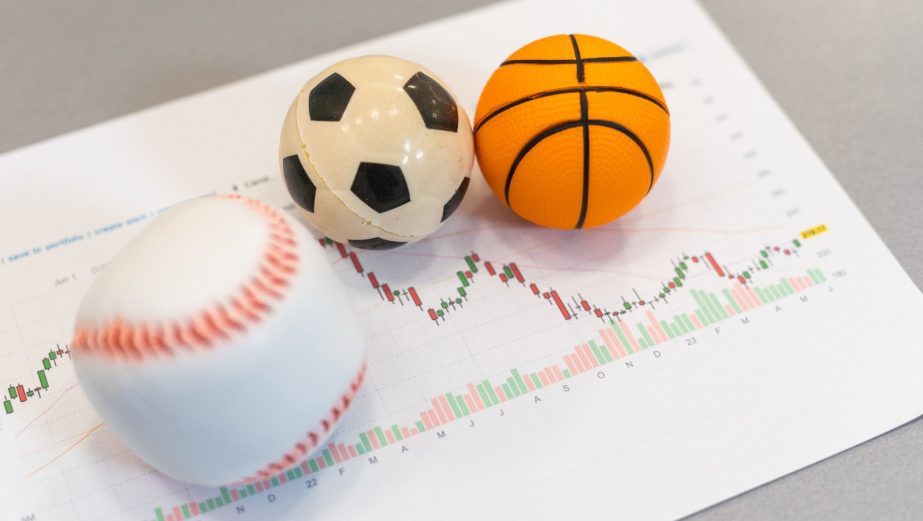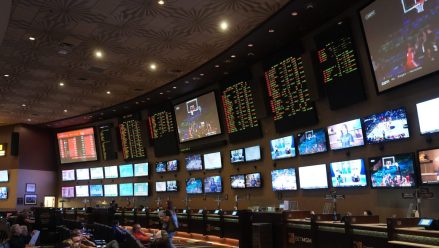They say that in a gold rush, you should sell shovels.
In the current AI boom, that mantra has been one that has delivered returns for a lot of investors.
That’s why the most valuable public company in the world isn’t one of the businesses training and releasing models, but the one that sells chips.
It’s a strategy that has worked out very well for many gambling industry investors as sports betting swept across the nation after the 2018 repeal of the Professional and Amateur Sports Protection Act (PASPA). Rather than buying into operators, many investors looked instead at tech suppliers that might build platforms, supply odds, or offer other services.
The advantages of the strategy are clear. You don’t have to worry about who eventually wins the biggest share of end-users. In fact, you don’t even need to worry about whether the consumer-facing businesses are profitable (most people digging for gold in 1849 weren’t). You just need to be confident that they’re willing to spend money.
Now, there may be another gold rush happening, one that again involves betting on sports. This time, it’s the rise of prediction markets and sports event contracts.
Prediction markets are still in a place of regulatory uncertainty, but they’re already facilitating tens of millions of dollars of trades per day. The biggest player is Kalshi, which garnered national attention late last fall when it won the right to offer contracts on the U.S. presidential election. Two months later, it self-certified to offer sports event contracts, though states have challenged whether it is allowed to do so.
On the Sunday of NFL Week 1, Kalshi processed just short of $200 million worth of trades.
If prediction markets move further into the mainstream, those numbers could get much higher.
But the biggest exchanges — Kalshi and Polymarket – have already raised money at valuations north of $1 billion, with backing from some of the biggest names in Silicon Valley. A report last Friday suggested that both are now worth much more than that, though, with The Information reporting that Polymarket fielded a $9 billion offer and Kalshi is soon to close a $5 billion financing round.
Polymarket appears poised to relaunch in the U.S. after it acquired an exchange that was already registered, named QCEX, in July.
Given the importance of liquidity for the exchange-betting model, there will probably only be a few successful exchanges when the dust settles. Most users will want to bet where everyone else is betting, because that’s where the best odds are likely to be. It may be tough for sports betting investors to pick who is going to win the race.
But there may be more opportunities to capitalize on the potential growth of prediction markets, especially for those used to financing startups in the traditional sports betting industry who may not want to place a big bet on prediction markets overhauling wagering entirely.
Investors have highlighted a few types of businesses already active in the sports betting space that could stand to benefit if prediction markets go mainstream.
Peter Heneghan is a principal at Bettor Capital, an investment firm that has had success in focusing on the “picks and shovels” of sports betting. Bettor Capital’s investments range from geolocation technology provider XPoint and parlay odds provider Swish Analytics to payments business Interchecks and online therapy service Kindbridge.
Heneghan tells InGame that prediction markets act as an extension of the online sportsbook market that many of Bettor Capital’s portfolio companies already work with.
“Our general focus is on the B2B suppliers within the broader real-money online gaming, where we describe what we do as a firm,” he says. “And I think that that can include prediction markets, that can include traditional sportsbooks, that can kind of include any sort of online gaming that involves real money.
“So I think we view it as kind of an opportunity for target market extension. And broadly, I think in many ways it does resemble, at least from a supplier perspective, online sportsbooks.”
Compliance is key
One of the biggest areas that could be important is compliance.
Some in the sports betting world have questioned whether prediction markets have the compliance and responsible gambling tools in place to reflect the fact that — to many of their customers — they’re primarily gambling platforms rather than financial tools.
And as the courts continue to mull the question of the legality of sports event contracts, a framework could emerge that puts clearer limits on what prediction markets can do, without keeping them out of the world of sports betting entirely.
Even if there are few legal limits, prediction markets may find that greater sports betting-style compliance tools help them win the trust of betting customers and dodge bad publicity.
“As prediction markets mature, they’ll need to mirror the integrity and consumer-protection standards we see in regulated sports betting,” Chris Grove, co-founding partner at Acies Investments, tells InGame. Acies has invested in compliance business Kinectify, as well as fantasy operator Underdog, sweepstakes business High 5, and Sporttrade — a betting exchange that is seeking approval from the Commodity Futures Trading Commission (CFTC) to operate as a federally regulated prediction market.
Integrity monitoring — the detection and prevention of match fixing or suspicious insider betting — seems like a clear area where prediction markets should want to ensure they have the best tools available.
With the option to bet both “yes” and “no” on all outcomes and to trade out of positions at any time, the potential to use a prediction market to cash in on manipulation can seem clear, especially if the markets exist in a regulatory structure that’s never been involved with sports betting before. Traditional sportsbooks are regulated by states, all of which have more strict consumer protections and responsible gambling regulations than the federal Commodity Futures Trading Commission, which regulates prediction markets.
“Sports leagues are already raising those issues, including information sharing, restrictions on certain markets, and player protections, which creates a real opening for the suppliers that provide those layers,” Grove says.
NationalBasketballAssociation050125-1Some investors already seeing effect
One fund that is already seeing something of a prediction market effect on a compliance business in its portfolio is SeventySix Capital.
The fund invested in U.S. Integrity, which focuses on preventing match fixing, in 2019, and Odds On Compliance, focused on regulatory compliance, in 2022. Last year, the companies merged to become IC360.
In March, IC360 partnered with Kalshi to offer integrity monitoring services in order to detect and attempt to stamp out suspicious betting activity.
“From the beginning, we knew the only way to achieve the true potential of prediction markets was to build a market that was as safe, trustworthy, and compliant as possible,” Kalshi CEO Tarek Mansour said at the time.
“Every decision we’ve made at Kalshi has followed that core principle, and our partnership with IC360 is rooted in that belief.”
SeventySix Capital Managing Partner Wayne Kimmel tells InGame that compliance and integrity are important things to uphold, so the company wants to see those tools adopted by anyone taking bets on sports, whether it’s via a sportsbook or a prediction market. It’s less a direct bet on prediction markets succeeding, he says, and more a belief that however betting happens, certain safeguards should be available.
“It’s incredibly important that we ensure that sports betting is at the highest level of integrity, that we have the highest level of compliance, that we have the highest level of education for teams, players, conferences, leagues, fans, regulators, law enforcement,” he says.
The same, he says, applies to responsible gambling tools.
“Whether it’s prediction markets or not, we want to make sure that there are the right tools in place for bettors who need to or want to self-exclude,” Kimmel adds.
“I think in general, a lot of the concepts are the same, whether it’s prediction markets or from a state-regulated sports betting perspective. Certainly there are some differences, but in general, really what we want to just do is make sure that we’re just making sure that everything’s secure.”
Finding the convergence
In Heneghan’s view, payments could be another area of growth. While sites like Kalshi and Polymarket have their own payment infrastructures, they’re built for a more financial type of customer.
He says “convergence” could be key: finding products that can work for what is still technically a financial product from a legal perspective, that are easy enough to use for a casual sports bettor.
Sportsbooks have worked to reduce friction in payments as much as possible. While prediction market payments are much more frictionless than traditional financial trading, they still lack popular options like Venmo or PayPal, and charge fees for debit card transactions, which major sportsbooks do not. Heneghan notes that it wasn’t long ago that financial accounts were mostly funded by checks, and the infrastructure is still adapting to more casual customers.
“The same way that Robinhood focused a lot more on user experience than more legacy brokerages before it, I think that for people who are looking to trade traditional financial derivatives, they probably have slightly different focus areas than people who are looking to make predictions on the outcome of sporting events,” he says.
“And I think because of that, there probably will be some level of convergence.
“I think that payments is an area where people will be signing up for KYC and expecting the same ease of payments that they have when they’re looking at DraftKings, FanDuel, or any other operator.”
Are there losers, too?
But if investors think certain types of companies could be the winners as prediction markets become more mainstream, are there also losers?
Heneghan says certain businesses that build sports betting platforms may struggle in a prediction-heavy new world.
“If you have a platform for sports betting today and then sports betting all of a sudden kind of starts to take a different shape and form where it’s kind of the back-end engineering necessary for a prediction market is very different than for a traditional sportsbook, I think that’s kind of the one area where it probably could represent a net negative if prediction markets were to become the predominant form of sports betting,” Heneghan says.
But at the same time, he thinks that most categories of business will have some way into a new predictions-led world. It will just be a matter of finding out how to adapt to the rise of a new kind of target market.
“For most other suppliers, I’d say it’s probably an evolving opportunity,” he says. “Maybe that’s being a participant rather than a supplier.”
The opportunity of getting into the market as a participant could be an enticing one for some companies. If you help create odds for certain types of bet, you may not be able to sell those odds to a prediction market the way you can do for a sportsbook.
But you can use those same odds to act as a market maker on a prediction market, offering to buy contracts for both the “yes” and “no” side of a given event. Not only are market makers able to make money by acting like a sportsbook, they also often receive rebates for providing trade offers to customers.
“Market makers are the obvious winners on the supplier side from the rise of prediction markets,” Grove says.
Businesses that collect and sell data, meanwhile, may not become market makers themselves, but could sell that data to those market makers the same way they sell to sportsbooks right now.
“Maybe someone like Kalshi is less likely to spend as much money on data as traditional sportsbook operators, but there’s going to be an increased opportunity to sell high-speed, low-latency data to market makers,” Heneghan says.
Neither long nor short
So far, Heneghan says Bettor Capital isn’t exactly “long” or “short” on prediction markets. It’s not betting that they’ll be the future of sports betting, but nor is it assuming they couldn’t be.
“I think it’s a potential area of opportunity and we’ll continue to work to help our portfolio companies address that opportunity as regulatory and then also just commercial opportunities as well.”
Kimmel expresses a similar sentiment: He’s just excited to bring new technology to whoever is offering sports bets.
“Just the fact that you’re using the latest and greatest technology to enhance an industry that people really enjoy, that’s something that we’re very excited about, whether it’s prediction markets or just any flavor of sports betting,” Kimmel says.
In Heneghan’s view, that’s the beauty of selling shovels: It’s a way to invest in a trend as broad-based as “gambling will increasingly take place online.” Most of the same shovels needed for sports betting will still have a use, even if it’s prediction markets digging up the gold.
“The kind of the unsaid part about that is that we don’t want to make massive bets of who’s going to find the gold or where we’re headed,” he says. “We want to be investing in businesses and helping businesses that are facilitating the continued shift from retail to online real-money gaming.”









